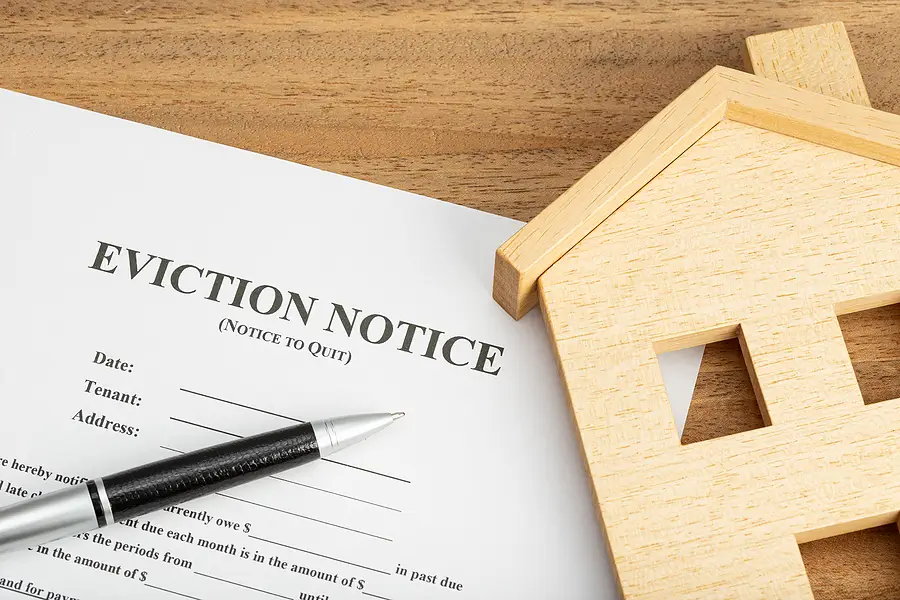Navigating the eviction process can be a tough job for you as a landlord, especially in a dynamic housing market like Phoenix, Arizona.
Evictions are not only legally complicated but also have long-lasting consequences for both you and your tenants. When you know how to navigate Phoenix eviction laws effectively, you can have the assurance that you’re properly safeguarding your rental property while maintaining a fair relationship with your tenants.
In this blog, we’ll walk you through the eviction process in Arizona, provide key insights into everything from lease agreements to court proceedings, and ensure that you’re well-prepared to handle any issues that come your way as a Phoenix landlord.
The Role of the Arizona Residential Landlord and Tenant Act in the Eviction Process
Evictions aren’t as simple as asking your tenant to leave your rental property since Arizona’s eviction laws are designed to protect both the landlord and the tenant. Under the Arizona Residential Landlord and Tenant Act, you have specific responsibilities as a landlord, and your tenants have certain rights that you must follow. In short, this law ensures that if a tenant violates the lease, there’s a structured process to follow.
Lease or Rental Agreement as the Foundation of the Eviction Process
The lease agreement is the backbone of your landlord-tenant relationship. A well-drafted lease agreement not only outlines your rental expectations but also sets clear terms for handling disputes. To guide you through, here are some of the key elements that you have to include in your lease agreement in Phoenix:
- Term of the tenancy
- Rental unit rules
- Security deposit terms and fees
- Repairs and maintenance
- Pet details
- Entry to rental property
- Applicable building codes
Causes of Evictions
Understanding the cause of evictions and how Arizona law views them is the first step in managing your rental property efficiently. The most common reasons for eviction are:
- Denying property access
- Disturbing the neighbors
- Expired lease
- Failure to pay rent
- Health and safety concerns
- Illegal activity
- Property damage
- Subletting
- Substantial renovation plans
- Unapproved occupants
4 Steps in Phoenix, AZ Eviction Process
As a landlord, you must follow several procedures when evicting a bad tenant.
Step 1. Giving Proper Notice to the Tenant
In Arizona, an important eviction action that you must do is giving your tenant a proper notice. This isn’t just a formality—it’s a legal requirement.
For tenants who are not paying rent, you must provide a written notice giving them five days to pay or vacate. If your tenant pays the entire rent costs within the 5-day notice, then the eviction process will not continue. Meanwhile, for other violations, such as unauthorized pets or property damage, you must comply with the notice period of 10 days. All notices must be delivered via registered or certified mail or hand-delivered using a process server.
Properly delivering the notice on time is crucial to avoid delays in the eviction process. If you fail to deliver the notice based on the legal standard, the entire case could be dismissed, costing you additional time and court costs.
Step 2. Filing an Eviction Complaint
If a tenant fails to comply with the eviction notice, you’ll need to escalate the process by filing an eviction complaint in court.
In Arizona, eviction complaints are filed in justice court, so you'll need to pay court costs and provide evidence of the lease agreement, the notice given, and any violations. Filing your case in the proper court and following its protocols ensures the eviction process proceeds smoothly.
Step 3. The Eviction Hearing
During the court date, both you and your tenant will present your case before a judge. This is where you’ll need to provide evidence and documents supporting your claim.
You need to hire a legal counsel or a lawyer to help you prepare and present your case effectively, which increases the likelihood of a favorable ruling. A well-prepared case can significantly impact the outcome of the eviction hearing, ensuring that your rights as a landlord are upheld.
Step 4. Eviction Judgment and Execution
Once a judge rules in your favor, an eviction judgment will be issued, and your tenant will be required to vacate the property. The judgment also involves steps for enforcing the eviction, often with the help of law enforcement officers.
You must take note that handling your tenant’s personal property and belongings must be done according to legal requirements. Properly managing the post-judgment process will help you avoid additional disputes and ensure that the eviction process is carried out smoothly.
Avoid Common Mistakes and Protect Your Property
Evictions can be time-consuming and costly if you don't handle them properly, which is why it’s critical for you to avoid these common landlord pitfalls.
- Failing to follow the correct legal procedures: An example of this is when you don't provide proper notice or use inappropriate methods to serve it. Arizona law is clear on these requirements, and not adhering to them can lead to your eviction case being dismissed in court.
- Charging unreasonable late fees: Be careful not to overcharge for late rent or fail to account for your tenant’s personal property after an eviction, as this can lead to further legal trouble.
What To Do: As a landlord, you should take preventive measures to minimize the risk of eviction. A well-drafted lease agreement can prevent many disputes from occurring. You also have to ensure your lease is clear on all terms, including rent due dates, late fees, and rules for the rental unit. Additionally, collecting security deposits can help cover unpaid rent or damages caused by your tenants. It is also essential that you have a proper tenant screening through a thorough rental application process.
Seek Legal Assistance with the Help of a Trusted Property Management Company
While many eviction processes are straightforward, some cases can become complicated—particularly when your tenant disputes the eviction or if they question whether you followed the Arizona law correctly as a landlord. In these instances, you should consider seeking legal assistance. Working with an attorney or community legal services can assure you that you’re following the law correctly and help you avoid potential pitfalls.
As a Phoenix landlord, you must understand the legal process, draft solid lease agreements, and ensure compliance with Arizona's eviction laws to protect your properties and business.
RPM Phoenix can take away the hassle of the eviction process from you while ensuring that your rental business is running smoothly and complying with state and city laws.
Apart from our property management services, we also offer Eviction Protection for your investment. This will reduce your stress during the eviction process and ensure your property can be re-rented immediately. This protection includes the recovery of your property’s possession, rent, and other amounts due.
Check out our Platinum Management Program and find out how it can help you with eviction legal fees with a reimbursement amount of up to $500.


